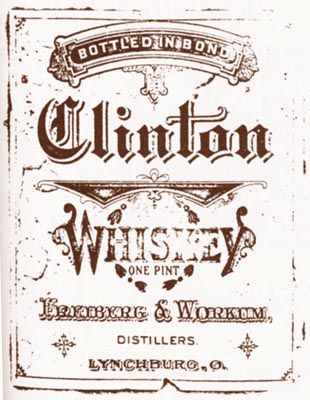As the war rages ever on, Southern Baptists continue hammering upon several sin themes to explain the South’s inability–yet!–to defeat the evil United States. Among the sins of the Confederacy that prevent God thus far from handing victory to His chosen nation are: extortion (the most common theme), Sabbath breaking, vice in the army camps, and alcohol–but never the institution of African slavery!
Today’s sin of choice, as voiced in North Carolina’s Biblical Recorder, is alcohol. It is a particularly delicate subject, as few Baptists at this time embrace abstinence. In addition, Baptists historically have welcomed alcohol, to the point of using real wine in communion (quite commonplace to date) and sometimes partially paying ministers in whiskey (perhaps not commonplace now, but still evidenced in some rural Baptist circles). Baptists’ affirmation of alcohol echoes the use of, and lack of condemnation of, alcohol in scripture.
Yet while drunkenness (prohibited in the Bible) has almost always been considered a sin in Baptist life, the Civil War proves to be a time that shakes some Southern Baptists’ faith regarding the appropriateness of using alcohol at all, as the near tee-totaling writer of today’s article, a minister who is a bit harsher than most Baptists regarding the issue of alcohol, reveals. The author voices an early attempt by Southern Baptists to re-interpret scripture–while seemingly remaining faithful to a literal interpretation of the text–to prohibit alcohol altogether. Many Northern Baptists, by contrast, long unencumbered with the necessity of a literal biblical text, have already been calling for alcohol abstinence for the good of family and society. Likewise, a non-literal, contextual interpretation of scripture drives Northern Baptist opposition to slavery (a practice also not prohibited in scripture).
From the Biblical Recorder:
In 1861, God gave us good crops of corn, wheat and oats. Our arms were successful almost everywhere. A short time before the close of 1861, corn was selling from $2.50 to $3.00 on a credit. Many by distilling their corn brought it almost to a famine scale, embarassing the condition of the poor soldiers’ wives. In 1862 (as the people in 1861 had turned the blessing into a curse,) God withheld his blessing by curtailing the crops. In 1862 people distilled their apples. Most of the reverses to our arms have been in 1862. By insulting God we may have a famine. His blessings were never given to be absurd. It is to be feared that the liquor was not for medicine, but for money and a useless beverage. My opinion is, that three-fourths of the evils in our churches are from drinking, and more professors will be lost on this than any other account. It should never be used as a beverage but as a medicine for mechanical purposes. I never will assist in ordaining a minister who drinks it as a beverage or advocates it as such. If I know it, I will never assist in sending such a man as a missionary in our Associations in our State, to our army, or to heathen lands. He will do more harm than good. As long as our ministers and members drink it as a beverage, we shall be troubled with drunkenness. The Bible pronounces a woe on the man who gives his neighbor drink. When preachers or members still corn or apples into liquor and then drink it as a beverage, the standard of piety will be always low in (sic) the neighborhood. If I had 1000 votes, I would never give one to a pastor who drinks liquor as a beverage or advocates it as such. Such men are scotching the car of Zion on the upper side of the hill. While our Boards and Executive Committees ought to be cautious on all points, they should be specially cautious about the missionary’s influence as to liquor. When a member does wrong, he is like a watch that leads only its owner astray; but when a preacher does so, he is like a town clock that leads every body astray. The greatest calamity to a country is to have ministers and members who exert a bad, moral influence. It wounds the Saviour in the house of his friends. We ought to have the most pious, prudent and exemplary men for our ministers and deacons.
Source: E. Dodson, “Intoxication,” Biblical Recorder, January 21, 1863 (link)



